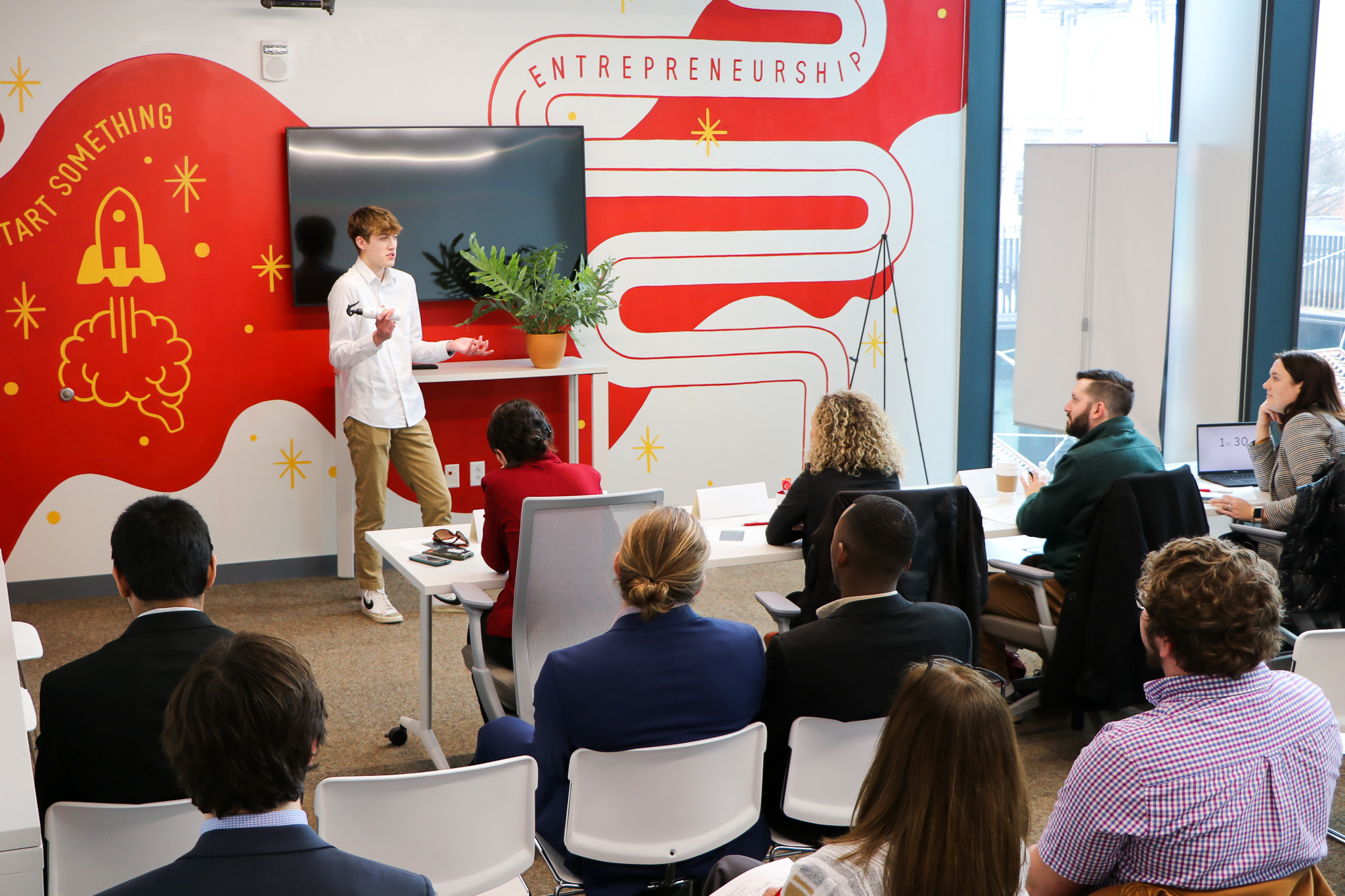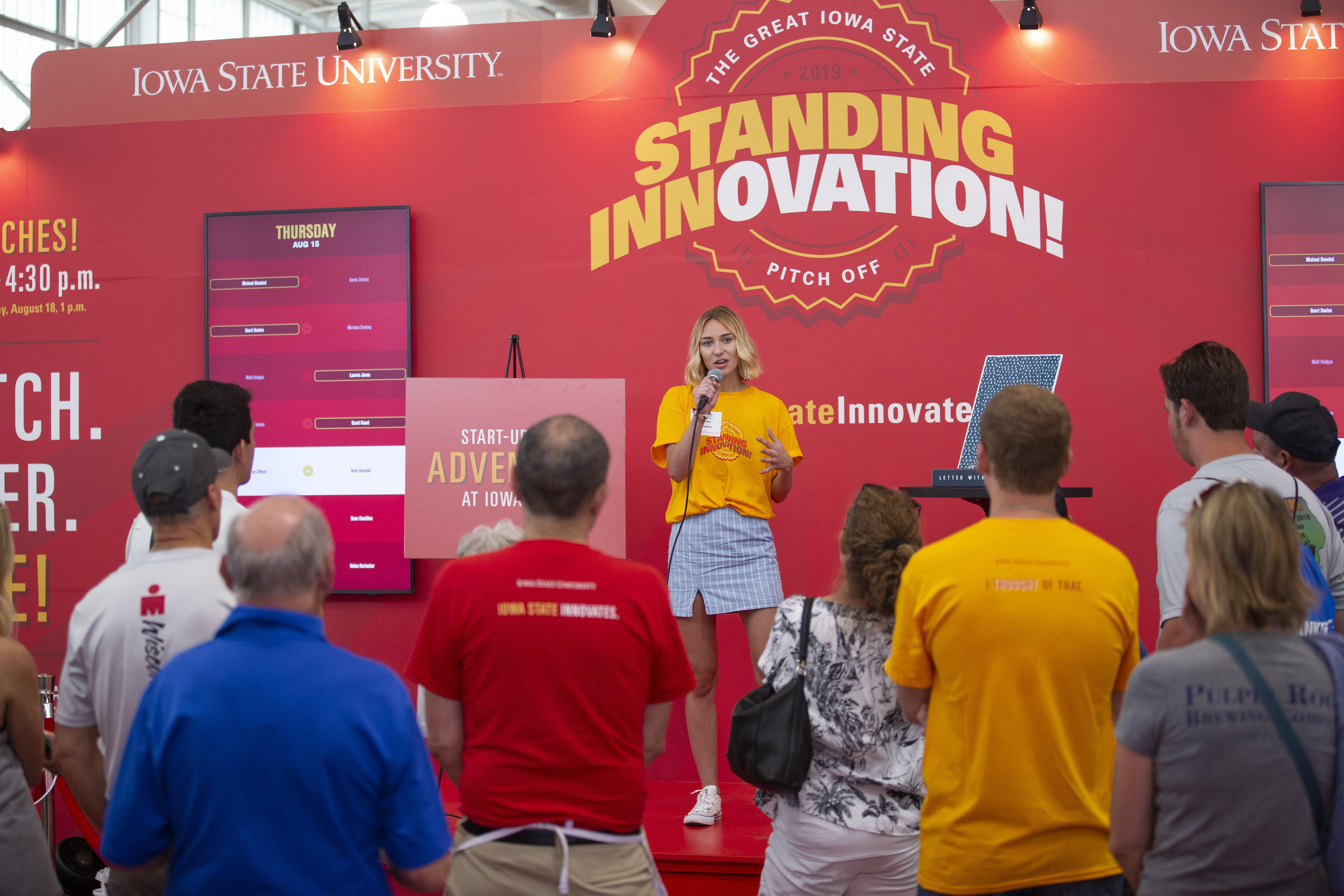
Iowa State’s Early Commitment to Building a Campus-Wide Entrepreneurship Program
Entrepreneurship and innovation are primary tenets of Iowa State University’s land-grant culture. The deliberate efforts from inception to not only embed entrepreneurship within each of the colleges, but also to network the college initiatives together across disciplines, has resulted in a unique, integrated culture and model for entrepreneurship at Iowa State University that reaches out to our community and to the world.
A Long but Fruitful Journey to Third Mission
Humble Beginnings
Iowa State’s commitment to startups began with the establishment of the ISU Research Park in 1987 and the opening of the Pappajohn Center for Entrepreneurship in 1996. At the time the entrepreneurship center was created, the Research Park consisted of two buildings and 8-10 startups. Today, the Park is home to more than 100 companies, with significant economic impact.
The Iowa State Pappajohn Center for Entrepreneurship was established in 1996 when Iowa venture capitalist and philanthropist John Pappajohn gifted Iowa State its first $1 million. Mr. Pappajohn’s vision was to change Iowa’s culture to support startups, “create 500 new entrepreneurs” in Iowa, and keep talented graduates in our state.
Under the leadership of the Dean of the College of Business, the university made a conscientious and deliberate decision to include each of its seven colleges in its entrepreneurship programming, essentially making entrepreneurial learning available to all of its 30,000 students. The deans and business leaders, including John Pappajohn, served as the entrepreneurship center’s inaugural advisory board. This institutional commitment was essential for supporting Mr. Pappajohn’s vision. The center chose to focus on three specific areas: 1) academic entrepreneurship and research, 2) experiential learning, and 3) venture support, specifically targeted toward commercializing university discoveries. Community collaboration has been a core component of the entrepreneurship program from the beginning.
In addition to leadership by the Deans, the university identified several faculty champions, representing all of the university’s seven colleges, as well as representatives from the Pappajohn Center for Entrepreneurship and the University Library, to form the “Entrepreneur Leaders” group. Now called Start Something Leaders, they continue to meet regularly today. Members of this group oversee the entrepreneurship curriculum, teach courses, engage in experiential learning, participate in professional development, and support students and faculty in their respective colleges.
Building a Comprehensive Academic Entrepreneurship Program
The university launched its formal entrepreneurship curriculum in 1997, establishing a cross-disciplinary minor in entrepreneurship. The minor was created intentionally with no prerequisites, a departure from other business minors, to make it accessible to all students, including students in technical degrees such as engineering, animal science, and architecture. A similarly-structured interdisciplinary graduate certificate in entrepreneurship (now fully online) was introduced in 2001. In 2017, the Ivy College of Business launched a major in entrepreneurship and Iowa’s first PhD in entrepreneurship. A newer experiential master in entrepreneurship launched in 2022.
The Department of Management and Entrepreneurship is currently home to a dozen tenured/tenure-track and senior lecturers, as well as PhD students, who teach a number of courses in the critical areas of entrepreneurship and innovation. Multiple Ivy business faculty have published their research in top journals in the field.
Education Beyond the Classroom
Located at the Research Park, the Pappajohn Entrepreneurial Center is largely focused on experiential learning and supporting new ventures, and serves as a liaison between the academic and business communities. The Pappajohn Center was designated to serve all of the colleges and centers across campus, while supporting startup companies through its programs.
Experiential programs include college pitch competitions, workshops, internships in startups, speaker events, student clubs and organizations, scholarships, weekend challenges, and a growing CyBIZ Lab student consulting program.

College-by-College Pitch Competition in Entrepreneurship Hub
Venture support programs include the immersive CYstarters summer accelerator for students, ISU Startup Factory incubator for post docs, faculty and community members launching scalable technology companies, and the Iowa Go-To-Market Accelerator, a joint program with the state’s BioConnect organization. All ventures have access to the Venture Mentoring Service, a program facilitated by the entrepreneurship center that provides a connection to alumni entrepreneurs, professional service providers, and investors.
Community Focus | Community Partners
The Office of Economic Development and Industry Relations (EDIR) provides a single point of contact or “one stop shop” for organizations wanting to connect with the university’s research, technical and business expertise, and workforce development capabilities. Entities within the EDIR umbrella include the Pappajohn Center for Entrepreneurship, Small Business Development Center, Office of Innovation Commercialization (technology transfer and university disclosures), ISU Research Park (500-acre development to house startups with services and amenities), and CIRAS (technical support for manufacturing companies).

Iowa State Fair - 150 pitches over 9 days
Presidential Leadership Initiative in Entrepreneurship and Innovation
President Wendy Wintersteen was installed as Iowa State’s 16th president in November 2017. With the launch of her brand campaign, Innovate at Iowa State, President Wintersteen established her vision of a university where innovation and entrepreneurship are part of every college, and opportunities abound for students and faculty to move their entrepreneurial ideas forward. The President’s subsequent Start Something brand launch connected the Pappajohn Center for Entrepreneurship with each of the college entrepreneurship programs, further cementing the entrepreneurship and startup culture she sought to cultivate.
The President created an Entrepreneurship Council of Deans that meets regularly to share best practices, identify collaborative opportunities, and provide updates about campus entrepreneurship and innovation programs and initiatives. The President has amplified the university’s entrepreneurship engagement and has firmly established Iowa State as a leader in entrepreneurship, as recognized by organizations including the Princeton Review, USASBE, Global Consortium of Entrepreneurship Centers, APLU, and ACEEU.
Student Innovation Center
Central to the President’s entrepreneurship and innovation vision was the creation of a 144,000 square foot Student Innovation Center. This state-of-the art facility located in the center of Iowa State's campus serves as the central meeting hub for students, classes, and clubs to draw students into exploring entrepreneurial opportunities, engage in pitch-off competitions, and network with individual and corporate entrepreneurs.
The Student Innovation Center is home to seven different makerspaces, a student-run coffee shop, a student-run retail store featuring Iowa State student creations, a glass-blowing studio, and two entrepreneurship hubs.
Community Engagement | Key to the Third Mission
At the heart of Iowa State’s land-grant mission is the practice of sharing discoveries, contributing to economic development, and making Iowa and our world a better place. The university engages in many successful partnerships with local and regional Chambers of Commerce, economic development organizations, community seed funds, state biotech organizations, startups, and corporations. Through these collaborations, the university shares its expertise, partners to move business and technology beyond the university’s walls, provides meaningful and beneficial experiences for students and faculty, and improves the world through its entrepreneurship and innovation initiatives.
Lessons Learned in Growing a Campus-Wide Entrepreneurship Program
1. Iowa State’s early decision to embed entrepreneurship across all academic disciplines meant the process for integration would be slower to implement. It took persistence and patience while each college adopted entrepreneurship in its own way and at its own pace, and took time to recruit and grow a tenured-faculty base to teach entrepreneurship within each of the colleges. Over time, however, these processes resulted in greater departmental buy-in.
2. Interdisciplinary collaboration is not only necessary but works very well in entrepreneurship. Faculty appreciate and share best practices across colleges. Students enjoy entrepreneurship courses that reach beyond their academic area of study. They enthusiastically engage in experientially-focused learning opportunities, which teaches entrepreneurial skills and thinking that will benefit them regardless of their career choice.
3. A central component of the university’s campus-wide ecosystem is a nimble entrepreneurship center that offers hands-on experiential learning opportunities for students, helps student and faculty entrepreneurs to start businesses, engages students across disciplines, and offers connections and links to external business communities.
4. Alumni who have pursued entrepreneurship or have supported startups love to give back, serving as speakers, mentors, fractional executives, or investors in startups.
5. Leadership buy-in and advocacy has been a game changer at Iowa State University. From the start, the goal was to create programs that had an immediate impact. Demonstrating success through metrics and storytelling helped to influence leadership adoption and support. The resulting educational ecosystem has led to a profound cultural and strategic shift with presidential and academic dean involvement and commitment.
6. Embracing the university’s land grant mission and cultivating business and community partnerships has mutually benefitted our campus and those served through many industry and economic relationships. Iowa State embraces its third mission beyond teaching and research and will continue to strive to do great things through entrepreneurship and innovation.
Iowa State’s story is a good example of how vision and institutional commitment combine to successfully implement entrepreneurship in the university culture. Receiving the ACEEU Entrepreneurial University of the Year – Americas award served as a tremendous validation of nearly three decades of work and collaboration to create an entrepreneurship program that involves all seven of Iowa State University’s colleges, reaches students and faculty across disciplines, and both integrates with and successfully contributes to the startup ecosystem community.
.

.
Image Credits:
Judi Eyles
Canva Pro